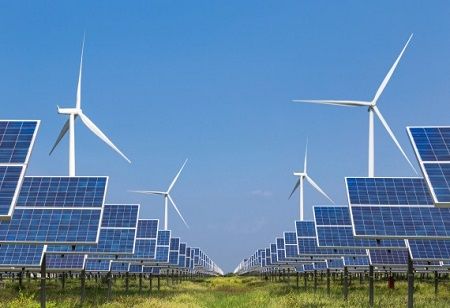
Germany and India Unite to Accelerate Renewable Energy Goals at Indo-German Forum

 Germany and India have further strengthened their renewable energy collaboration under the Indo-German Partnership for Green and Sustainable Development (GSDP). A key event, part of the International Solar Festival at Bharat Mandapam, will focus on ‘Financing the Renewable Energy Revolution,’ highlighting the financial investments, political frameworks, and social initiatives needed to achieve India’s ambitious clean energy goals.
Germany and India have further strengthened their renewable energy collaboration under the Indo-German Partnership for Green and Sustainable Development (GSDP). A key event, part of the International Solar Festival at Bharat Mandapam, will focus on ‘Financing the Renewable Energy Revolution,’ highlighting the financial investments, political frameworks, and social initiatives needed to achieve India’s ambitious clean energy goals.
India aims to reach 500 GW of renewable energy capacity and 125 GW of green hydrogen production by 2030, a target that represents a significant step toward a sustainable energy future. The upcoming discussions will emphasize not just financial aspects but the critical importance of creating resilient and eco-friendly systems to support these initiatives. Leaders from the political, financial, and social sectors will convene to explore sustainable strategies to advance India’s renewable energy transition.
Uwe Gehlen, Head of Development Cooperation at the German Embassy in New Delhi, emphasized Germany’s longstanding commitment to renewable energy. "Our early decisions to innovate and take risks in developing sustainable technologies have been crucial. This partnership with India goes beyond technology transfer; it is about supporting India’s leadership in the global energy transition", said Gehlen. He further noted that Germany’s role is not just about providing advanced technologies but also about fostering local capacities and reinforcing regulatory frameworks to support sustainable energy practices in India.
Ajay Mathur, Director General of the International Solar Alliance (ISA), echoed this sentiment, noting the core role of sustainability in the Indo-German partnership. "The collaboration between India and Germany can significantly accelerate the deployment of renewable technologies like solar energy, ensuring these sources remain accessible, affordable, and sustainable", Mathur said. He added that by combining the expertise of both nations, they can create momentum to achieve the shared goal of a resilient, sustainable energy future.
This event comes at a crucial time for India, as the nation is on a fast track to achieving its renewable energy targets. The discussions will focus on several key areas, including reducing environmental risks in renewable energy investments, promoting social inclusion through skill development, and strengthening political commitments to long-term sustainability. These topics are critical to ensuring that India’s transition to renewable energy is both ecologically sound and socially equitable.
Germany’s involvement in this partnership is part of a broader effort to support India’s push for sustainable energy investments. The two nations are working together to de-risk renewable energy projects, ensuring they are designed to minimize environmental damage, promote local livelihoods, and reduce reliance on fossil fuels. This comprehensive approach aims to integrate sustainability at every level of India’s energy transition, from financial strategy to social engagement.
The event will also serve as a precursor to RE-INVEST 2024, India’s premier platform for showcasing its renewable energy potential. Insights and discussions from the Indo-German series will contribute to the broader sustainability goals set for the country, ensuring that investments in renewable energy are aligned with long-term environmental and social outcomes.
The Green and Sustainable Development Partnership (GSDP), which was launched in 2022 by Indian Prime Minister Narendra Modi and German Chancellor Olaf Scholz, is central to this collaboration. Rooted in the goals of the 2030 Agenda for Sustainable Development and the Paris Agreement, the GSDP aims to foster cooperation in green energy, climate change mitigation, and resilient infrastructure development. Both nations see this partnership as a critical driver for advancing the global sustainability agenda, particularly in the context of their shared commitment to renewable energy and climate resilience.